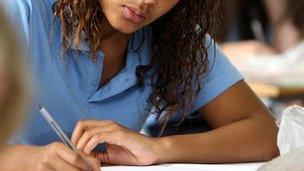Why the Ebacc Certificates sank and what happens next
- Published

The select committee's report had criticised some of the plans
Six months ago, England was heading for a big shake-up of the exam system with a move to a new exam for 16-year-olds called the English Baccalaureate Certificate - but that idea has now been scrapped. Why? And what exams will teenagers take in future?
The EBC was a key part of Michael Gove's plans to "restore rigour" to England's exams system, which he said had been discredited and had become "dysfunctional" under Labour and been "dumbed down".
The EBC hit the buffers for political, practical and commercial reasons and in the face of strong opposition from the Liberal Democrats, the exams regulator Ofqual and MPs on the Education Select Committee.
The idea of an exam which was not for everyone was very unpopular with the Lib Dems and with teaching unions, who all warned of a move to a "two-tier" system or a return to the divisions of O-Levels and CSEs.
Those exams had been replaced by GCSEs, with the idea of an exam that all pupils could take, albeit at various levels.
Now, it seems, England will have what many had called for - a reform of the existing GCSE system - rather than a revolution in qualifications.
Pupils were due to begin studying for EBCs in some key subjects in 2015 and the qualifications were to be rolled out to other subjects after that.
The main difference between the EBCs and the existing GCSEs is that they would not have been set by a number of exams boards.
Other features, such as their being taken at the end of two years of study rather than in stages, and a cut in resit opportunities, have already been brought in under coalition changes to existing GCSEs. Pupils beginning GCSE courses this year are already affected by those changes.
At the moment, schools can choose which exam board they use for every subject and pay the individual boards.
'Badge of failure'
Mr Gove believes such a system fuelled what he called "a race to the bottom", with exam boards being tempted to offer easier qualifications to win schools over to their exams, leading to a "dumbing down" of qualifications.
The government's plan was to put each subject's EBC exam out to tender with exams boards and then choose one board to be the provider for a particular subject.
That proved unpopular with the exam boards themselves, who did not like the idea of investing time and money in tendering for one of the subjects only to lose out.
But the main thing which sank the EBC was the opposition to the idea of an exam which would not be suitable for all, most crucially, from the Liberal Democrats.
With only about 60% of 16-year-olds currently achieving the government's benchmark of five good GCSE passes including English and maths, it is clear many young people might not have passed the EBCs, which were being presented as more demanding than the current exams.
The idea had been that those students who could not succeed in those exams might get to do various other qualifications, including vocational options, and get a "certificate of achievement".
The Conservative chairman of the Education Select Committee, Graham Stuart, warned the certificate would be seen as a "badge of failure".
The criticism of that committee, coupled with a warning about speed of change from England's exams regulator Ofqual and fierce Lib Dem opposition to the EBC combined to defeat it.
What now?
So what of today's teenagers and schools?
Firm details emerged at Westminster as Michael Gove spelt out his change of heart, as well as his plans for a new national curriculum.
Pupils over 14 have already begun revamped GCSE courses, where exams are mainly taken at the end of two years' of study.
But Mr Gove has also announced that from autumn 2015, teaching will begin for "new" re-vamped GCSE courses in English, maths, the sciences, history and geography.
These will also be linear - rather being than taken in "chunks" and there will be no separate "foundation" papers for less academic pupils, where the maximum grade possible is a 'C'.
And officials say there will be fewer "bite-sized questions" and more depth.
Accountability measures for schools are also going to change - and school leaders are welcoming this.
At the moment, they are measured in league tables on how many pupils at a school achieve five good GCSEs (A* to C) including maths and English.
A recent addition to that was the "English Baccalaureate" measure - which measures how many achieve good passes in a certain mix of subjects the government regards as crucial to a good education.
They are maths and English, two sciences, a humanity (geography or history) and a modern foreign language.
It had been heavily criticised by teaching unions and some groups, especially those involved in the arts, who said it would narrow the curriculum and that fewer young people would study art and music and other non-Bacc subjects as a result of it.
And few schools were managing to "look good" on this measure. Across England, only about one in five teenagers achieved it.
That English Baccalaureate is not a qualification in its own right but rather a measure of achievement and many found the similarity between that and planned new EBC exam confusing.
This measure is remaining, although it could become less prominent because a new one is proposed, which will be a wider version, with more subjects included.
The new measure is already being dubbed "the best eight" because it would measure pupils' performance in eight GCSE subjects, which have to include English and maths, three English Baccalaureate subjects and three others.
Mr Gove told the Commons the changes would introduce a "more balanced and meaningful" system which would give a wider view of performance.
- Published7 February 2013
- Published7 February 2013
- Published31 January 2013